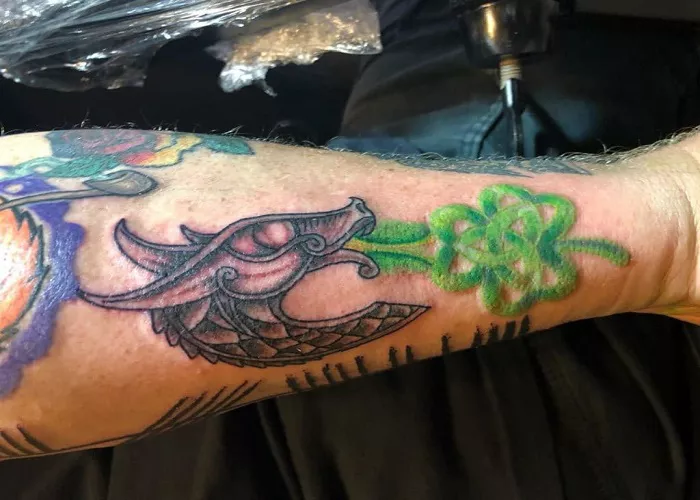At the Latin Market bakery in Lewisville, Texas, the air still smells of sugar and cinnamon, but something is missing.
That something is Neri Jose Alvarado Borges—a 31-year-old Venezuelan asylum seeker who had become a fixture in the small business, known for his quiet demeanor and tireless work ethic. His absence isn’t temporary. Borges, his family and friends say, was ripped from his life in North Texas and sent to one of the most feared prisons in the Western Hemisphere.
His alleged crime? A tattoo.
Ink etched on Borges’s upper arm shows a multicolored ribbon made of puzzle pieces—an internationally recognized symbol for autism awareness. Beneath the ribbon is the name of his younger brother, who has autism.
To Borges, it was an emblem of love and advocacy. To U.S. immigration officials, it was evidence that he belonged to Tren de Aragua, a violent Venezuelan gang with an expanding international footprint.
Now, Borges is locked inside El Salvador’s CECOT facility—the infamous “mega prison” designed to hold gang members. The 40,000-bed complex is home to alleged terrorists, cartel hitmen, and—his family insists—one innocent bakery worker who just wanted a better life.
From Venezuelan Crisis to Texas Bakery
Neri Jose Alvarado Borges fled Venezuela’s crumbling economy and deepening humanitarian crisis in 2023. After crossing the U.S. border in west Texas, he settled in Lewisville, a suburban city north of Dallas. There, he found steady work baking traditional Venezuelan treats at Latin Market, a community hub for immigrants seeking familiarity and comfort.
“Everybody working here knows Neri is a good person,” said Juan Enrique Hernandez, the bakery’s owner and Borges’s friend. “He’s a good brother, a good friend. Never had trouble with anyone.”
In February 2025, Borges’s life took a sharp and unexpected turn. Immigration and Customs Enforcement (ICE) agents arrested him at his apartment complex. Hernandez and others visited him the following day at the Bluebonnet Jail near Abilene, where Borges told them he had been charged with illegal entry.
Borges, who had applied for asylum, carried documentation that he believed protected him. But officials pointed to his tattoo as evidence of criminal affiliation.
“And he said, ‘But I have my asylum. I have it here with me,’” recalled Hernandez. “And they said no—you’re going to jail because you have a tattoo.”
When Symbolism Becomes Suspicion
The misunderstanding centers around Borges’s tattoo: a rainbow ribbon of puzzle pieces. To most, it clearly signals autism awareness—a symbol worn by thousands of advocates and families around the world.
But ICE officials interpreted the artwork as gang-related, claiming its design matched tattoos used by Tren de Aragua, the Venezuelan criminal organization known for extortion, kidnapping, and transnational violence.
Experts have long warned of the risks of interpreting tattoos out of cultural context. In El Salvador, the government under President Nayib Bukele has systematically used body art to identify suspected gang members, often resulting in mass detentions and limited legal recourse. Now, that policy appears to be shaping U.S. deportation decisions as well.
“There is no due process when a tattoo becomes the only proof,” said immigration attorney Jaime Barron. “You’re talking about a man with no criminal record, no arrest history, and suddenly he’s on a plane to one of the most dangerous prisons in the world.”
ICE confirmed Borges’s deportation, saying he was arrested under Title 8 authority, which allows for swift removal of individuals who enter the U.S. illegally. An immigration judge issued a final removal order on March 5. Borges was deported just over a week later.
Days after his family lost contact with him, his name appeared on a list of 238 Venezuelans deported from the U.S. to El Salvador’s Cecot mega prison—first published by CBS News.
His sister, speaking from Venezuela to NBC 5, said the family has heard nothing since.
A One-Way Ticket to a Fortress
CECOT—short for Centro de Confinamiento del Terrorismo—has drawn global attention for its harsh conditions, mass incarcerations, and sweeping anti-gang policies. Photos from inside show inmates shaved bald, shackled at the wrists and ankles, packed in rows on concrete floors.
El Salvador claims the prison has brought peace. Human rights groups argue it has cast too wide a net—sweeping up the innocent along with the guilty.
“There is no clear legal avenue to get someone out once they’re in,” said Barron. “Especially if the Salvadoran government believes the tattoo is proof of gang involvement.”
That belief has already sealed the fate of others. In another case, a Venezuelan soccer player named Jerce Reyes was detained for a crown tattoo over a soccer ball—allegedly tied to Tren de Aragua. Reyes says it was a tribute to Real Madrid, his favorite team.
Community Fights Back
Back in Lewisville, Borges’s friends and former coworkers are left feeling helpless. Hernandez says he’s making plans to travel to El Salvador himself.
“I try to help him because I know he’s no criminal,” Hernandez said. “And I need to help. He’s my friend.”
The bakery still carries Borges’s presence—his pastries, his recipes, his photo on the staff board. But his absence is a daily wound.
“This isn’t justice,” Hernandez said. “It’s a mistake. A dangerous one.”
For now, Borges remains inside a fortress meant for the worst of the worst—his only apparent crime being a tattoo of love.
Related topics:

